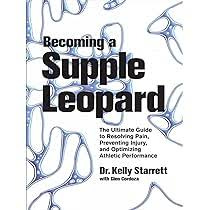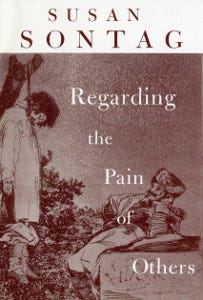Dear lovely readers,
Quickest note before I delve into thoughts on suppleness and silliness: I’ve been teaching a 10-month Novel Revision Program through Pioneer Valley Writers’ Workshop, where Joy Baglio has created an incredible community of writers, and applications for next year are open. I’ve also been doing increasing one-on-one coaching, editing, and manuscript consultations—while my website is still in progress, feel free to get in touch if you are interested in working with me.
And now,
How to be a Supple Leopard…
Don’t forget, I like a mess!
—a line from a micro-story by Diane Williams I used to have written out and pasted to the wall & have lost & cannot remember the title of1
Attempted Sports Metaphors
A few years into my long marriage, my ex-husband got into weight training. He had once been a young athlete before turning to philosophy as a profession, and he loved the things about sport that I hated. He loved tiny incremental changes and doing drills to perfect technique. I loved to play and throw myself around (being able to fall or dive for a ball wholeheartedly is one of my favorite plays), and I hated to be stuck near a barbell, which seemed an anchor. I hated to be trapped. I liked to think I could escape and get somewhere with my body, on a run, say, or a very long bike ride, and if not I would at least like the opportunity to win. I refused to to get into weight training the way he did, despite how strong he was getting, and despite how strong I got when I tried CrossFit for a while. I didn’t want sport for sport’s sake. I wanted it to give me other pleasures besides.
We compared this difference to a clear difference in our personalities: I preferred the scrimmage and he preferred the drill.
In fact, I despised the drill.
When I want to get better at something, I like to get better accidentally, holistically. Probably making more mistakes than necessary. I did well at school not through discipline but through engagement. I was not a person who could learn using flashcards. Mostly I think you acquire technical abilities as a writer by immersion and by play. Maybe you could cross-train, a bit, by learning a second language to become acquainted with the grammar of your first.
I have been wondering about my trait here, that I love when things befall me, that I long for an accident of love or luck, that I wait for the world to surprise me. I was raised in a strange fatalistic belief system, so perhaps that is why it is difficult for me to be in a situation where I feel trapped or too much in the know or certain that if I just complete particular steps I will achieve particular results.
I hadn’t meant to write about sports, or to tell you that lately I have been taking tennis lessons, forcing me, a person who loves tennis, to learn how one is supposed to hold a racquet, how to approach a ball and hit it, and forced to do drills. (And I mean forced—our coach makes us practice holding the racquet “for your own good” when I keep hoping for a game and tells me I need to break myself of the habit of “love taps",” my favorite bad move).
I had wanted to write about this book my ex bought many years ago. Becoming a Supple Leopard. I loved this title. I loved to laugh about this title. The word “supple,” first of all, but the sound of the word “supple” with the word “leopard,” those Ls and Ps, and how poetic I determined such a book might be.
What a thing to aspire to be, secondly. I too wish to be a supple leopard, I would say, in that yapping shorthand of marital noise. Let’s be supple leopards!
If the book is poetic it is accidentally so.2 It lays out a doctrine of mobility, things one must do for one’s body to remain capable of withstanding the strains of extreme fitness. Often, in those days, my ex would patiently explain if you press a lacrosse ball painfully against a muscle, or use a foam roller a certain way, and if and only if you do this consistently (the horror) you can prevent all the injuries that are otherwise inevitable.
Alas, the injuries remain inevitable.
Becoming a Supple Writer
People keep telling me how much I appear to be thriving. It’s true I’ve weathered things with capacities I had not known myself to have. What I thought of for a while as mettle I think may really have been suppleness—flexibility, pliability. I have been seeking both suppleness and silliness. I am trying to live life well in the present—hence, foolishly taking tennis lessons during a time of financial super-precarity. I am burdened by difficulties and by tasks and instead of thrashing around in response I’ve been meeting them with a kind of hm, I guess that’s life?
The many tasks have eaten into my time and left less for reading and writing. But I am trying—perhaps delusionally—to see all the things that I do in my life—my little jobs, my little job applications, my little oil changes and too-frequent grocery trips—to see all of them as worthy of interest.
Still, actual writing is medicinal for me. The time I took off this week from worrying about money and health care and the myriad other troubles in this leopard’s thorn-addled paw to sit for two straight hours to read and to write offered me this old reliable physical relief. The balm seems to be writing a sentence that I find beautiful or interesting or true, one that I hadn’t thought before writing it because writing is a way of surprising myself, of pulling up and out of the straight-line results-orientation and into a slowly revelatory vista. Why should it feel so? Like the opposite of a barbell, of an anchor.
It’s the advice I’ve been giving constantly to writers I’m teaching, and it’s advice I take myself: play, try things out, don’t hold too tightly to what you think a thing should be. Don’t clutch!
Giggle Theory Life Hack
A twelve-year-old was last week scolded by her teacher for giggling in class. The teacher told this child to “grow up.” I was astounded, since I had that same day gotten the giggles about something one of my students did and have been known to sometimes get lost to them, even in class, even when I’m supposed to be the grown up, in charge. Getting the giggles has always had a positive effect in those situations. True silliness bonds people to each other and makes us feel at ease. Earlier that week we had played Fortnite, which I am terrible at and so the laughter is inevitable, when I fail to aim, or drive my car into a building, or walk right into a more agile player who proceeds to slay me with a chainsaw. Another twelve-year-old said to my kid, “it’s nice that you have a silly mom.”
I laugh easily, as I cry easily, as I feel all my emotions easily and fully. I used to hate this about myself. It certainly seemed to worry everyone. I have been reflecting on this again, as I’ve been writing about my lifelong question: what does it mean to be mentally well or mentally ill? I found an essay I was working on a few years ago about the anxiety support group I was in after my third child was born, and something terrible that happened in the group (but comical later) was that we were always asked to talk about our biggest anxieties and provoke new anxieties in each other. I wrote in that essay, which was called “How to Make a Decision,”
People, including my mother, were always telling me to calm down and to stop taking everything so seriously.
Sometimes other people would tell me that I didn’t take anything seriously.
You can hardly trust people.
During high school, when I went through a mystical depression, I also was in a deep Monty Python phase and found a key to living in the final song of Life of Brian (as well as a huge girlhood crush on Eric Idle):
The irony is part of the pleasure of this scene, obviously, and as with the Louis Armstrong’s “What a Wonderful World” played during horrifyingly apocalyptic “12 Monkeys.”3
I don’t think this is toxic positivity. I hate toxic positivity. But I am a pleasure seeker, now, finally, after years of painful religious guilt. As I said to one of the translators I was working with in a classroom last week, when two kids were having a bout, “We should just let them be for a minute. Getting the giggles is one of the great pleasures of life.”
(This is perhaps why some people call me chaotic.)
Writing/Reading Recommendations
I loved this craft lecture by Torrey Peters on “Strategic Opacity” and why Hamlet makes no sense, as I love everything David Naimon puts out with Between the Covers.
I also recently happened on a story I hadn’t read in an anthology I’ve owned for years called Object Lessons: the Paris Review presents the Art of the Short Story. The story was “Lying Presences” by Norman Rush from 1982. It’s about two brothers who have had a lifelong disagreement about how one ought to live, and one has run into some problems because of UFO society he’s been part of and is not on the outs with. Here are a few bits I loved:
(Roy believes you should brush your teeth with salt, Jack can’t stand it):
Jack did some deep-breathing exercises to calm down. Of course Roy would never say anything about salt. You’d just have him wandering around the kitchen in the morning with a toothbrush, saying could he trouble you for some salt? And the salt would be in plain sight.
And:
Jack wondered when Roy’s yes-yeah copula was going to show up. Yes was what Roy felt comfortable saying, but yeah was what he thought he really ought to be saying, being a man of the people. So he would say yes (yeah), with a slight diminuendo on the yeah. Stress would do it. Jack wondered whether the fact that nobody really changes was encouraging or tragic.
It’s put me into a Rush-dive since.
I’ve just started reading Sontag’s Regarding the Pain of Others, a copy of which I bought at the thrift store I’ve been frequenting with my children and which copy is filled with endearing marginalia that mostly consists of definitions of words. It’s the essay I needed right now, an essay that helps me understand some of what is happening to us online right now in the midst of our witnessing.
For a long time some people believed that if the horror could be made vivid enough, most people would finally take in the outrageousness, the insanity of war.
Donate to Doctors without Borders.
Guess what! I later found it. It’s called “My Highest Mental Achievement.”
I think? When there was no evidence of poetry I refused to read it.
And I came up with example without realizing the Monty Python link to 12 Monkeys, and now I’m feeling a bit mind-blown about its influence on me.



